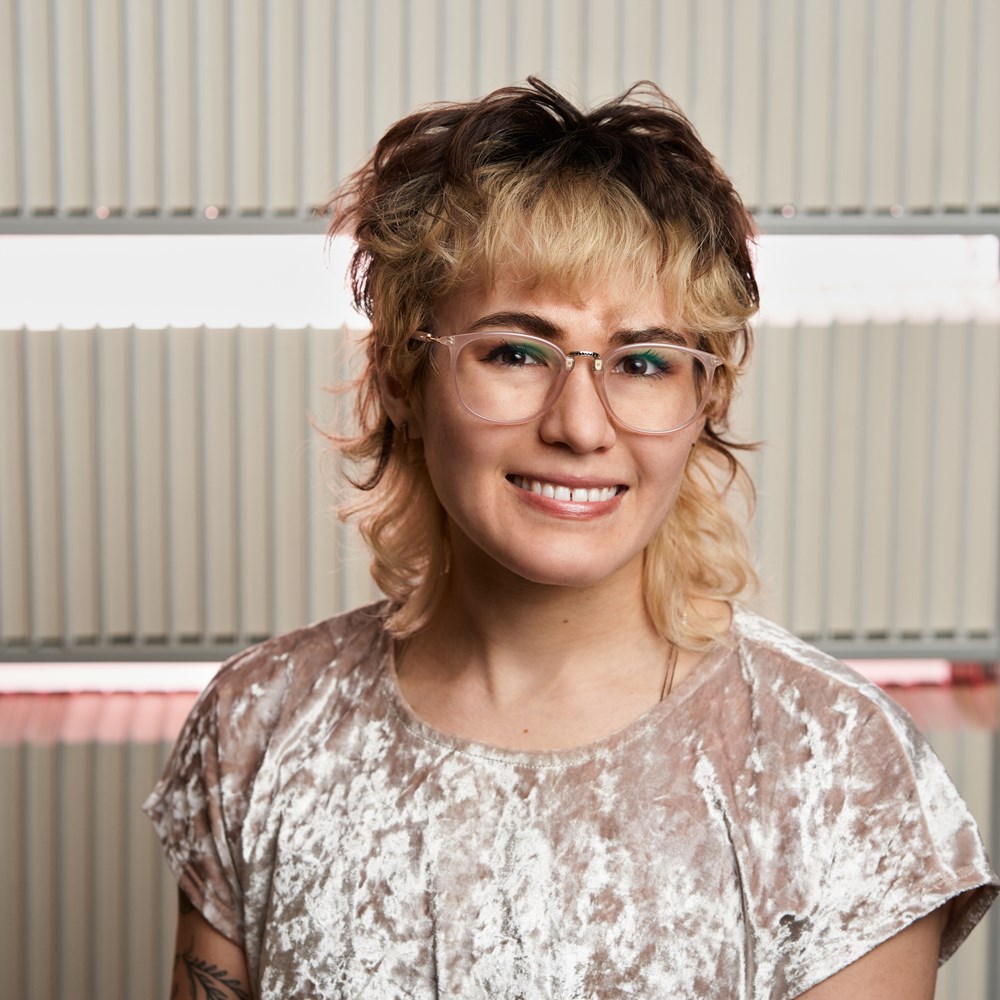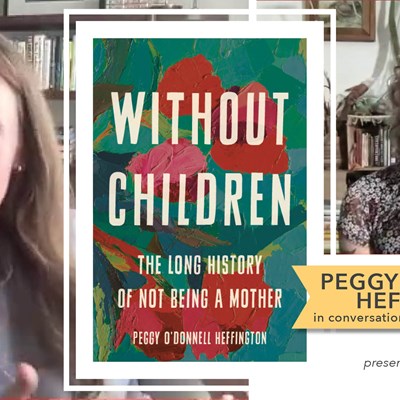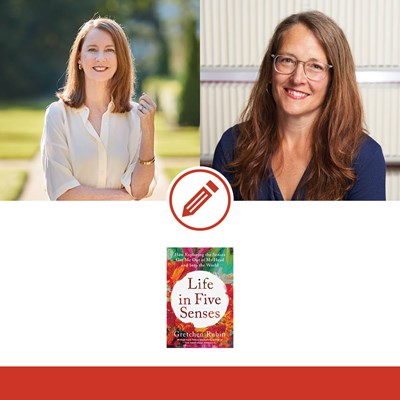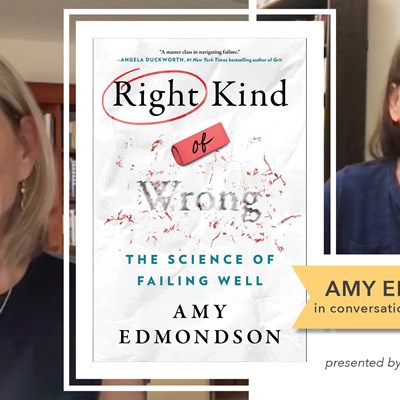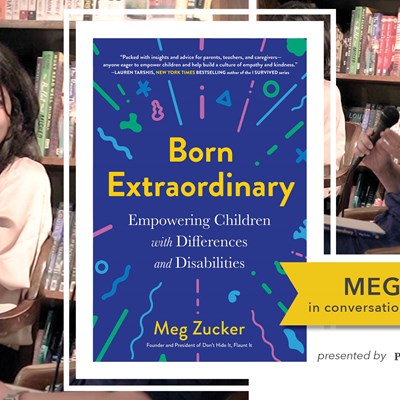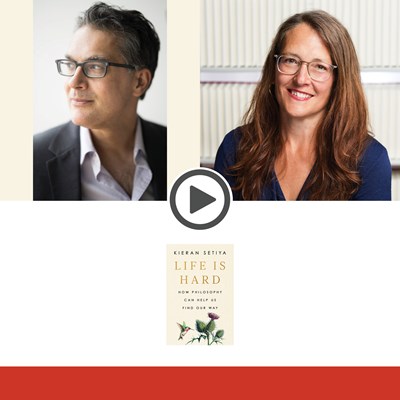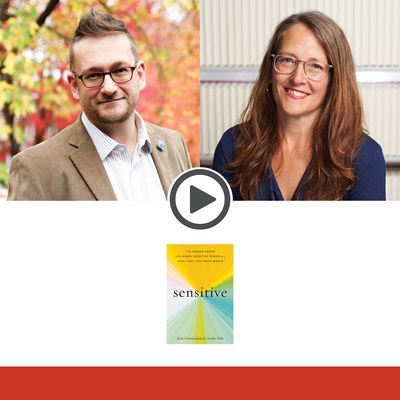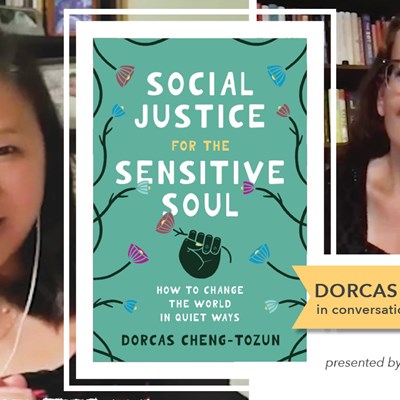'Fighting for Our Friendships': An Interview with Danielle Bayard Jackson
May 17, 2024
Friendship coach and author Danielle Bayard Jackson offers insight into what makes women's friendships so important, so difficult, and so worth fighting for.
Order copies of Fighting for Our Friendships: The Science and Art of Conflict and Connection in Women's Relationships for your book club, organization, or friends! We at Porchlight Book Company offer competitive discounts on all bulk book purchases, and can ship individual books in an order to multiple addresses.
To keep up with announcements of future events in the series, sign up for our newsletter. If you have questions or would like to participate in this series, feel free to contact us.
Transcript
GABRIELLA CISNEROS:
For many of us, making friends was easier in our school years when we were physically close to the same people each day, when it was more acceptable to be openly vulnerable, when classes and clubs made it easy to find people you could connect with, and there were just simply more opportunities to be social throughout the day.
But for the friendships that we do forge, how do we help them flourish?
In Fighting for our Friendships, friendship coach and educator Danielle Bayard Jackson helps readers navigate the complexity and fragility of female friendships–what they're made of and what why they're worth having. It presents an essential perspective, one that shows that self-help also includes cultivating connections with others.
Welcome, Danielle! To start from even before this book was born, how and why did you become a friendship coach?
DANIELLE BAYARD JACKSON:
So I always joked that being a friendship educator certainly wasn't on my vision board when I was ten, you know? I started as a high school English teacher teaching 11th and 12th graders. And it was the number one thing that students wanted to talk to me about between classes and after school. And I also had a front row seat to watching the ways in which the boys tended to congregate and fight and connect–and then the girl students. And it was very interesting. So I was almost like in my own lab watching this.
And then after being a teacher for a while, I became an academic chair. So I was leading a large department in one of the largest counties in America. And the teachers during our department meetings wanted to talk about ways to help students navigate their social conflicts in class.
After I left the world of education, I got into public relations, and I was really surprised to see that even when I was working with high achieving, charismatic women, they too secretly also were struggling in their female friendships. And so for the past six years, I've leveraged my education background to study what the research has to say about women's cooperation, communication, and conflict.
GABRIELLA CISNEROS:
How do people, friends decide to go to a friendship coach? Is there a checklist of attributes that are met to help anyone decide if they should see a friendship coach?
DANIELLE BAYARD JACKSON:
Yeah, so that's a great question. So as a coach, I normally work with just one person. I have tried to mediate before, but you know, coaching is best one-on-one, because the whole point of coaching is you're sharing what your personal goal is for your friendships right now. And sometimes your goals don't align with your friends.
You know, I actually, had one session where I did talk to two friends at once, and it was really tough because I would say 30% through the session, it was very clear that they had two different goals. And I don't think it was clicking.
When it comes to being with a friendship coach, I think people tend to picture it being some awkward introvert who's a wallflower, who doesn't know how to talk to people. 80% of my clientele is high achieving women who own businesses or they're entrepreneurs doing their thing.
They're very charismatic. They've got lots of connections in their phone, but they are deeply unsatisfied with the friendships they have, and they feel like they have nowhere to share that or to figure out.
I think it's great that people are opening their minds to getting support for something that we often talk about, like it's something you should already just naturally have figured out, because a lot of times you don't.
GABRIELLA CISNEROS:
Can you tell us in a few sentences what the book is about, who it's for, and why it's different than other books out there—similar topics or the same topic.
DANIELLE BAYARD JACKSON:
Fighting for Our Friendships is a book that attempts to explain the mechanics of women's friendships: What brings us together, what tears us apart. And it also provides tangibles to help us navigate the day-to-day business of connecting with other women, which can be really tricky. And it's for anybody who wants to understand the mechanics of women's friendships.
I hope that when people read it, they feel tangibly equipped, they feel informed with the research that's shared, and I hope they feel optimistic about all that's possible in their friendship landscape in the future.
I think this book is different because there have been a lot of friendship books that have come out, which I'm so grateful for.There are different voices, different style, different angles, and this is one of very few books that focuses on friendship at the intersection of gender and the unique ways that women communicate, how they congregate, how they engage in conflict–sometimes it's very unique. And so, I'm happy to be a voice in this space, and I'm really hoping that people find it to be really helpful.
GABRIELLA CISNEROS:
So, the book's first section explains why and how we should maintain friendships. And then the second section breaks down common types of friends and conflicts associated with each. And then it's in part three that the chapter “How to Make Friends Worth Fighting For,” is situated. The title of the book is about maintaining friendships, but I thought it was really good of you to include a chapter about how to even make friendships in the first place, since that was also my first thought about a book about friendships is how hard it is to make friends as an adult. And being able to grow those friendships to the depth of the ones that you made when you were younger seems like a bit of a challenge. So, I found that chapter really interesting and helpful.
The book is a good reminder to pay attention to the friendships that we already have, before going out and trying to add more people to our circle. Could you give some insight into why you wrote and structured the book the way that you did?
DANIELLE BAYARD JACKSON:
Yeah, thank you for that question on the format of the book. We did spend a lot of time figuring out ‘how do we want to shape this.’ And I've noticed that for a lot of people who are in the friendship space, there is a lot of conversation around making friends. In fact, it's the number one question I get: how do I make friends as a mom, as a divorcee, as a woman in a new city?
And so there's already so much around that. And I want to focus on helping us with conflict because it's inevitable, and a lot of us don't make it once the tension happens. But you can't talk about conflict without talking about the kinds of friendships we enter into, and what we're looking for, and the expectations we carry, and how we show up and position ourselves to invite these people into our lives.
You can't have those conversations without one another. So, we put it at the end of the book to end the book on an uplift; We wanted to get into the nitty gritty and help us to say, Okay! All right, I can do this. I understand how women are the way they are. But we wanted things to end positively and optimistically so that if a woman's like, oh, as I read this, I realized mistakes I made in the past, things I would like to do differently. Then we end on a tone of hope. So now that you're equipped with all this knowledge, the next time we enter into fresh friendships, we're entering in with this information, with this self-reflection, this new self-awareness. and so it was important to us to end, on that note.
And so, I have heard people say what you say, like, okay, that's interesting to end the book with how to make these friendships, but I'm hoping that it makes people feel energized afterwards of like, yes, let's go do this.
GABRIELLA CISNEROS:
I love that. I really like how each chapter is laid out to illustrate a common archetype of friend, like “the clingy one,” “the jealous one” and stuff like that. But it doesn't water down your friends either. With the stories that you include in each chapter, it really helps us understand the ways that these people show up in our lives and how their actions build up over time. You know, it's not like one toxic friend who, like you immediately know that they're toxic or anything. It involves a lot of reflection on how other people's actions impact you and how you also are part of it. It doesn’t make one person the enemy and one person the hero sort of thing.
DANIELLE BAYARD JACKSON:
I really appreciate you saying that because some of the feedback I appreciate most is what you just said. When people are like, oh, I like that you didn't vilify anyone.
When we talk about “the clingy friend,” “the love obsessed friend,” my whole argument with that is just that sometimes when you get into it with a friend, you begin to reduce her to the problem she presents and we lose sight of all her humanity.
And my goal was to show us that with that love obsessed friend, what else is going on that affects the way you might be experiencing her in this season? So that when I do generate how I want to respond to all that's going on in it, compassion informs the decisions I make about my behavior because I can say, You know what? I think she's coming from this angle. I think she's had this going on in her life, so at least I can draw some compassion and empathy before I lean in. Now, that doesn't mean I have to just tolerate, you know, what's going on if at some point it becomes too much. But I'm hoping to help our friendships be stronger, because we've been informed with some perspective and also some tangible tools to recover after tension appears.
GABRIELLA CISNEROS:
I found a lot of the human psychology-based stuff to be applicable to work relationships and things like that too. Like it doesn't have to apply to friends you hang out with every day. It could also be women at work, or anyone you spend a lot of time around for whatever reason, I think the, the tools that you give in the book are useful.
DANIELLE BAYARD JACKSON:
Oh, that's so true. I'm so glad. Yeah, you're actually right. You know, sometimes I have men I work with or, you know, women who don't have a friendship issues, have a work issue, and they [ask me advice] like, well, I know you just talk about women's friendships... And, you know, a lot of it is transferable to different spaces.
GABRIELLA CISNEROS:
What makes women's friendships different from men's friendships?
DANIELLE BAYARD JACKSON:
Oh, gosh. So many things. First, I like to start by saying a lot of us value the same things. We all want somebody who will listen and who we have shared interests with. And we can talk to... So to be clear, we all want the same things.
But I think the difference is we prioritize them differently. So, for example, the research tells us that the number one thing women look for in their same sex friendships is emotional support. That's not true of men. So, it impacts the way we relate and connect to one another.
Also, women are more dyadic than men, meaning we get together one on one, we form these pairs, and that accounts for why we tend to be so close and have these intimate bonds. But men, you know, I wish things were different, but often they're not as close. They're not seeing each other as often. And when they are, they're not sharing personal things.
And there's been new surveys that have come out to show that even what we're leaning into in conversation with one another is different. Women tend to talk about work, family, mental health, things that are personal and relational, but men [talk about] current events, sports, things like that.
And the whole point of the book is to answer the question: Women's friendships are deeper than men's, but they're more fragile. Why is that? What can we do about it? That's the premise of the whole book.
The research finds that women's friendships are more fragile, meaning we're having them dissolve more than men's friendships, which sounds bad. And people tend to stereotype and say, That's because women are petty and dramatic. And the truth is we integrate our friends into our lives so deeply. In fact, the research tells us that we integrate our friends into our life to the degree of a sibling, but men to the degree of a cousin. So we are locked in.
That heightens the likelihood that we might have a falling out, because we're so close. You're likely not falling out with people you're not invested in to begin with. So when you are keeping people at arm's distance, you're not talking about personal things, you don't expect much of them. We're probably not in conflict, because you're way over there.
And when we're fused so closely, yeah, there's going to be more opportunities for tension to rise.
GABRIELLA CISNEROS:
Totally. Like you said: when you're so close with someone, it makes it more dramatic of a falling out when there is something that goes wrong. Do you have any advice on approaching conflict in our friendships?
DANIELLE BAYARD JACKSON:
The first is to anticipate that it's going to happen, which sounds so simple, but a lot of us, I don't know that we admit it. We don't expect conflict to happen in friendships. For a lot of us, when conflict happens, we see it as evidence of our incompatibility. But we know to expect it with a romantic partner. We know to expect it with coworkers or with our children or our parents. But for some reason, we subscribe to the idea that friendship should offer some chemistry, and it should be easy and fun, because that's what friends are. And if we get into it [we think], oh, I guess we're not as close as I thought. And it doesn't always mean that. So, the first thing you can do to manage conflict is to not freak out when it happens or think it means it's time to go.
The second thing is: there are so many things we could be doing before conflict happens. I always say whenever we're in some kind of tension, hopefully it goes well, because for the past two years we've been doing things to strengthen the friendship, so that it buffers against the micro stresses that happens. So if I've always been communicative with you about how I appreciate you, if I'm always initiating things, if I'm always saying, “hey, let’s spend time together,” if I'm always being a listener and I'm being vulnerable with you, then when I do something to disappoint you, hopefully there's some kind of grace, some benefit of the doubt. You want to work with me on it, because I've established with you that I'm invested and I care. And so for a lot of us, I think we'd be more resilient with conflict if we we anticipate that it's even going to be a thing.
GABRIELLA CISNEROS:
That's so smart. Wow. National Best Friends Day is not a highly marketed holiday. But when I think about days to celebrate friendships, I think about, like, bachelorette parties or baby showers, but those days center on one person. And the only other day I could think of is Galentine's Day, which was first popularized in 2010 by [the TV show] Parks and Recreation. So it made me wonder: how do you think media and pop culture affects girls and women's relationships with other women? And has it changed over time?
DANIELLE BAYARD JACKSON:
You know what, it has! It's changed a lot even since I wrote the book. I started writing the book three years ago. Gen Z... I know sometimes they get a lot of, flack, but they are very strong and vocal champions of women supporting women. They don't tolerate the mean girl thing. And I'm loving that. And so, I definitely see more podcasts and shows and movies that are looking at the intricacies of our friendships instead of just making them kind of typical, you know, where we're either braiding each other's hair at a sleepover or we're having cat fights. I love that it's showing us getting into fights and then recovering or talking through things.
So hopefully women can see these things and have a model of what it looks like to recover and repair. So I’m definitely seeing the conversation of female friendship, change. And I think a lot of that as well is because, even in academia, you have more women studying this. Before, you had men gatekeeping things and determining what gets research, what doesn't. Now you have a lot of women in there saying this is a valid area to talk about, and I'm going to dedicate my career to researching the way women talk or a women's bonds, which I think is really cool.
I'm loving seeing the shift. I think it's going to be really important for future generations.
GABRIELLA CISNEROS:
So, you're in the middle of a book tour. How is it going? And are there any standout responses to the book that you've received?
DANIELLE BAYARD JACKSON:
It's going great! I'm from Tampa, and we just kicked off the book tour here in my hometown, and it was sold out, which was so amazing. And it was just really cool to see the diversity in the room–ehnic diversity, generational diversity. You've got older women, girls in college, moms, women who were childfree. It was amazing.
And I can work with clients and I can do these keynotes, which are fun and all, but there's something about being in a room with a bunch of other people who are all intentional and curious about friendship and having conversations and saying, “I've been through this.” “Oh my gosh, me too.” You can't replace that. It's just really, really special.
And so, it was just a nice reminder of why I do what I do. And it was really cool to be able to facilitate a moment for women to connect with one another.
So I'm loving being on book tour, but not for myself–for the women who are coming to gather. What they're getting out of it is so beautiful and energizing. I'm really just drinking in this whole season, because it's been really great.
GABRIELLA CISNEROS:
Oh that's awesome. Three more questions that are kind of broad. One of the great things about books is that they tend to lead readers to other books. What books related to women's friendships would you recommend people read after or before reading your book?
DANIELLE BAYARD JACKSON:
Ooo, I've never gotten that question. It's so good. I'm always raving about the book Platonic by Dr. Marissa G. Franco. It's definitely a New York Times bestseller. It’s terrific.
I also recommend, The Other Significant Others by Rhaina Cohen—she explores the idea of what would life look like if friendship were at the center, not romantic relationships, and unpacks that.
It’s really good and opened my eyes to a lot of things. Those are two books, that I love so much, and I recommend to everyone.
GABRIELLA CISNEROS:
Cool! What are what are you reading right now?
DANIELLE BAYARD JACKSON:
Oh, good question. What am I reading right now? I recently finished a book called Maame [by Jessica George], and that was so good.
I just try to have a good mix of fiction and nonfiction, because I like to learn. And then sometimes you also need to just escape reality for a second to just, like, not burn out.
And I'm also reading Radiant Rebellion by Karen Waldron, and it's a book about how we view aging. And she's sharing this research on how it's not what we think things just go downhill, but how a lot of things actually get better, including mental health [which] gets better as you age. So, my birthday's coming up. And I was like, I think I really need to read this book. And it's been amazing.
GABRIELLA CISNEROS:
Do you have any other projects that we should look out for?
DANIELLE BAYARD JACKSON:
Keep posted to betterfemalefriendships.com, because we're trying to host more events. We do speed friending events that women really like. And, we have a couple other things going on in group coaching coming out. So there's a lot of things always in the works.
I just think it's really great that women are leaning into the fact that they can get support for platonic relationships, too. And I'm happy to be a person who's helping to make those resources available.
GABRIELLA CISNEROS:
Thank you so much, Danielle!
DANIELLE BAYARD JACKSON:
Thank you for having me.



